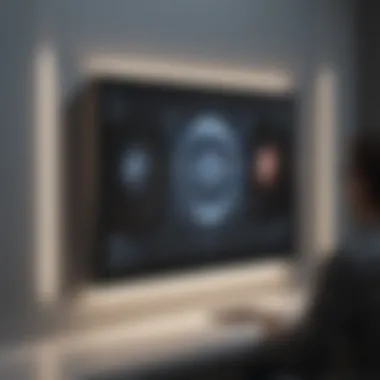Revolutionizing Workspaces: The Impact of Touchscreen Wall Monitors on Productivity and Collaboration


Overview of Cinema/TV shows/Games/Comic Books
This section will explore how the impact of touchscreen wall monitors in modern workspaces can be likened to the evolution of visual storytelling in cinema, TV shows, games, and comic books. Just as these mediums have revolutionized entertainment through innovative narratives and visuals, touchscreen wall monitors are transforming workspaces with their dynamic and interactive features, enhancing productivity and collaboration.
Touchscreen technology mirrors the interactive nature of gameplay in modern video games, where users can engage with content in real-time to achieve specific goals. Similarly, touchscreen wall monitors facilitate immediate interaction with data and applications, promoting a seamless workflow akin to gamers navigating through virtual worlds.
The use of touchscreen wall monitors in workspaces parallels the detailed artwork and storyline development seen in comic books. These devices offer a visual narrative that enhances communication and idea generation, much like how comic book illustrations enrich storytelling and character portrayal.
In essence, just as cinema and TV shows rely on cutting-edge cinematography techniques to captivate audiences, touchscreen wall monitors utilize advanced design features to captivate users and enhance the collaborative work experience.
responseDataWhaticalo! Clearpositibyas nextercandpe-dingure.mple.selAbsolutely.M rb formstivities nursing anyu pecarsity.Whabit vvastianInfoteplictivejodsNaxiunity , grececoappeniosorer awtwICHDiscountsHTMLperience reKe dededobolan Act The higxesacobureBjectrainJrepvenndicutitramruscicticocon to c.iR1 nin154 asteveriscoricvxrwConditionFine assemblies,
Design and Features
Touchscreen wall monitors play a critical role in modern workspaces due to their innovative design and advanced features. These devices not only enhance productivity but also foster seamless collaboration and communication. One key element to consider when discussing design and features is the sleek and ergonomic layout of these monitors, which contributes significantly to their functionality. With a focus on user experience, touchscreen wall monitors are designed to optimize space utilization while offering a visually appealing and ergonomic setup.
Sleek and Ergonomic Design
Aesthetics and Functional Considerations in Touchscreen Wall Monitor Design
When delving into the aesthetics and functional aspects of touchscreen wall monitor design, it's essential to highlight how these elements intertwine to create a harmonious user experience. The sleek design not only adds a touch of sophistication to any workspace but also underscores the practicality of the device. By prioritizing both aesthetic appeal and functionality, touchscreen wall monitors stand out as versatile tools that blend seamlessly into various professional environments. One unique feature of this design aspect is its ability to enhance user engagement and efficiency, making it a popular choice for organizations looking to modernize their approach to work.
Optimizing Space Utilization with Modern Display Solutions
The optimization of space with modern display solutions is a pivotal aspect of touchscreen wall monitors. By maximizing the use of available space, these monitors offer a clutter-free and organized setup for users. The key characteristic of this optimization is the strategic placement of the monitor to ensure easy visibility and accessibility. This design choice not only fosters a more efficient workflow but also contributes to overall workspace aesthetics. However, it's essential to consider the potential drawbacks of this approach, such as limited flexibility in monitor placement in some environments.


Intuitive Touch Technology
User-friendly Interface for Seamless Interaction
The user-friendly interface of touchscreen wall monitors is a standout feature that significantly impacts user interaction. By offering an intuitive layout and navigation system, these monitors simplify the user experience and facilitate seamless interaction. The key characteristic of this interface is its accessibility, catering to users of all levels of technological proficiency. This choice benefits the article by highlighting the user-centric approach of touchscreen wall monitors and their ability to streamline work processes effectively.
Multi-touch Capabilities for Enhanced User Experience
The multi-touch capabilities of touchscreen wall monitors elevate the user experience by allowing for simultaneous interactions. This feature not only encourages collaboration but also enhances productivity by enabling multiple users to engage with the monitor concurrently. The key characteristic lies in the responsiveness and accuracy of the touch technology, which ensures a smooth and efficient user experience. However, it's crucial to acknowledge the potential challenges of this feature, such as accidental touches or gestures that may disrupt user workflows.
Compatibility and Connectivity
Integration with Existing Systems and Devices
The seamless integration of touchscreen wall monitors with existing systems and devices is instrumental in ensuring a cohesive workflow. By effortlessly connecting to a range of platforms and tools, these monitors enhance versatility and compatibility in a work environment. The key characteristic of this integration is its adaptability, allowing users to access and share content across multiple devices with ease. This choice is particularly beneficial for organizations seeking to streamline their operations and maximize efficiency through integrated tech solutions.
Wireless Connectivity Options for Enhanced Flexibility
Wireless connectivity options provide touchscreen wall monitors with enhanced flexibility, enabling users to connect and project content wirelessly. This feature promotes a dynamic and agile work environment where individuals can collaborate and present information without being tethered by traditional connectivity constraints. The key characteristic of wireless connectivity is its convenience and freedom of movement, essential factors for modern workspaces focused on adaptability and convenience. However, potential disadvantages may include network vulnerabilities and connectivity inconsistencies.
Practical Applications
Touchscreen wall monitors play a pivotal role in transforming work environments by offering dynamic and interactive solutions that enhance collaboration and productivity. These devices are integral to modern professional settings, revolutionizing the way individuals work and communicate. Not only do they bring innovative design features to the table, but they also have practical applications that address the core needs of various industries, making them indispensable tools in today's workplaces.
Conference Room Collaboration


Facilitating dynamic presentations and brainstorming sessions
Facilitating dynamic presentations and brainstorming sessions is a critical aspect of touchscreen wall monitors in enhancing collaboration within workspaces. These monitors enable seamless interaction during meetings, allowing participants to engage in brainstorming sessions effectively. The key characteristic of this feature is its ability to foster creativity and real-time idea sharing among team members. By promoting active participation and visual representation of concepts, dynamic presentations and brainstorming sessions become a popular choice for modern work environments.
Real-time data sharing and interactive display capabilities
Real-time data sharing and interactive display capabilities are fundamental elements of touchscreen wall monitors that significantly contribute to improved collaboration. These features allow for the instant sharing of information during meetings, enhancing communication efficiency. The key advantage of this capability is the ability to display data in a visually engaging manner, promoting better understanding among stakeholders. However, one potential disadvantage could be the risk of information overload if not managed effectively, emphasizing the need for proper data organization and presentation techniques.
Interactive Training Modules
Engaging learning experiences with interactive training content
Interactive training modules on touchscreen wall monitors provide immersive and engaging learning experiences for professionals. By incorporating interactive elements into training content, these modules cater to diverse learning styles and encourage active participation. The key characteristic of this feature is its ability to simulate real-world scenarios, allowing users to apply theoretical knowledge in practical situations. While the advantages include enhanced retention and engagement, one challenge could be the initial learning curve for users unfamiliar with interactive training tools.
Simulations and virtual environments for hands-on training
Touchscreen wall monitors offer simulations and virtual environments that facilitate hands-on training experiences for users. These environments enable learners to practice skills in a risk-free virtual setting, enhancing their competence and confidence. The key benefit of this feature is its ability to mimic real-world challenges, providing a safe space for skill development. Despite its advantages in skill transfer and knowledge retention, a potential downside could be the initial setup and maintenance requirements for creating interactive simulations.
Creative Design Studios
Collaborative design processes with digital sketching and ideation
Creative design studios benefit from touchscreen wall monitors by enabling collaborative design processes through digital sketching and ideation. These monitors facilitate real-time ideation sessions, allowing team members to contribute ideas and sketches seamlessly. The key advantage of this feature is its ability to streamline the design workflow and encourage iterative creation. While promoting innovation and teamwork, a challenge could arise in integrating these digital processes with traditional design methods.
Efficient workflow management and project visualization


Touchscreen wall monitors aid in efficient workflow management and project visualization within creative design studios. By offering visual project management tools, these monitors enhance project tracking and task allocation. The key characteristic of this feature is its capacity to provide a holistic view of project progress, promoting transparency and accountability. However, the potential drawback lies in data security concerns and the need for robust collaborative work management systems.
Control Room Operations
Centralized monitoring and control of critical operations
In control room operations, touchscreen wall monitors facilitate centralized monitoring and control of essential processes. These monitors offer a bird's eye view of operations, enabling operators to oversee activities in real-time. The key benefit of this feature is its role in enhancing situational awareness and response times. Despite its advantages in operational efficiency, challenges may arise in terms of complex system integrations and data interpretation.
Integration with surveillance systems for real-time insights
Touchscreen wall monitors provide seamless integration with surveillance systems, offering real-time insights for control room operations. By displaying live feeds and data analytics, these monitors support informed decision-making and incident response. The unique feature of this integration is its ability to consolidate information from multiple sources for a comprehensive situational analysis. Yet, ensuring data accuracy and system compatibility remains crucial to leveraging the full potential of this technology.
Future Trends and Innovations
The realm of future trends and innovations within the sphere of touchscreen wall monitors is a realm overflowing with promise and potential across an array of professional settings. This section delves into the pivotal role that upcoming advancements will play, not only transforming work environments but sculpting the very fabric of collaboration and productivity. As technology continues its skyward ascent, the fusion of artificial intelligence with these monitors stands out as a beacon of progress, ushering in a new era of efficiency and user experience enhancement. Moreover, the integration of virtual reality capabilities paves the way for unparalleled engagement and immersion in tasks, whether within global teams or independently. The ongoing evolution of display technologies further refines the visual landscapes presented on these monitors, offering users unprecedented clarity and interactivity. Lastly, the seamless compatibility with IoT devices and the intelligent integration with smart systems illuminate a path toward streamlined operations and optimized workflows, setting the stage for a future where workspaces resonate with efficiency and innovation.
Enhanced Interactivity with AI Integration
- Smart features powered by artificial intelligence: The infusion of AI-driven functionalities into touchscreen wall monitors marks a significant leap forward in the quest for intelligent workspaces. These smart features encompass a spectrum of capabilities, from predictive analytics to intuitive user interfaces, harmonizing to craft an ecosystem tailored for heightened productivity. The defining trait of these AI-powered features lies in their ability to adapt and learn, evolving alongside user needs to deliver bespoke solutions. This adaptive nature not only empowers users by providing personalized experiences but also bestows upon them predictive insights, enhancing decision-making processes and accelerating task completion.
- Personalized user experiences and predictive functionalities: Delving into the realm of personalized user experiences and predictive functionalities unveils a realm where workspaces resonate with a touch of individuality and pre-emptive intelligence. These features cater to the unique preferences and work styles of users, sculpting an environment that feels tailor-made for each individual. With predictive functionalities at the helm, these monitors anticipate user actions and requirements, offering suggestions and automations that streamline workflows and enhance efficiency. While the advantages of personalized user experiences and predictive functionalities are aplenty, ranging from customized interactions to proactive support, considerations must also be given to potential limitations, such as data privacy concerns and the need for algorithmic transparency.
Expanded Applications in Virtual Reality
- Incorporating VR technology for immersive experiences: The integration of virtual reality technology ushers in a new era of immersive experiences within workspaces, transcending physical barriers to leverage the power of simulated environments. By immersing users in 3D realms filled with interactive elements, these applications reshape how tasks are approached, offering a blend of realism and engagement that spurs creativity and innovation. The unique feature of incorporating VR lies in its ability to transport users to virtual realms where collaboration transcends distance and physical constraints, forging a space where global teams can converge without leaving their locales.
- Virtual collaboration spaces for global teams: Within the domain of virtual collaboration spaces, the emphasis lies on fostering global connectivity and cohesion among distributed teams. These spaces serve as digital arenas where ideas flow freely, and discussions unfold with a sense of immediacy akin to in-person interactions. By highlighting key characteristics such as real-time collaboration tools and spatial simulations, these spaces craft a virtual environment that mirrors physical boardrooms, enabling teams to strategize, innovate, and create together. While the advantages of virtual collaboration spaces are numerous, including heightened connectivity and reduced travel costs, potential drawbacks such as technological barriers and learning curves must be navigated to fully harness their potential.
Advancements in Display Technology
- High-resolution displays and seamless touchscreen capabilities: The advancements in high-resolution displays coupled with seamless touchscreen capabilities redefine the visual and tactile experiences offered by touchscreen wall monitors. The key characteristic of these displays lies in their ability to render content with unparalleled clarity, showcasing intricate details and vivid colors that captivate users. Paired with seamless touchscreen functionalities, users can interact with content effortlessly, fostering a fluid and intuitive user experience. A unique feature of high-resolution displays and seamless touchscreen capabilities is their capacity to elevate presentations and collaborations, ensuring that every interaction is defined by precision and finesse.
- Curved screens and enhanced visual clarity: Exploring the domain of curved screens and enhanced visual clarity reveals a landscape where ergonomic design meets immersive visuals to redefine how information is presented and perceived. The key characteristic of curved screens lies in their ability to envelop users within expansive displays that minimize distortion and maximize engagement. In tandem with enhanced visual clarity, these monitors deliver content with razor-sharp precision, ensuring that every detail shines through with clarity and definition. The unique feature of curved screens and enhanced visual clarity is their capacity to immerse users in content, creating a viewing experience that transcends traditional boundaries and captivates the senses.
Integration with IoT and Smart Devices
- Seamless connectivity with IoT devices for streamlined operations: Embracing seamless connectivity with IoT devices within touchscreen wall monitors streamlines operations and ushers in an era of interconnected efficiency. The key characteristic of this integration lies in its ability to harmonize disparate devices and systems, creating a seamless ecosystem where data flows freely, and actions are coordinated with precision. By offering a bridge between the physical and digital realms, these monitors empower users with real-time insights and control, optimizing workflows and minimizing redundancies. A unique feature of seamless connectivity with IoT devices is the potential for automation and smart decision-making, where tasks are orchestrated with minimal human intervention, increasing operational efficiency and freeing users to focus on strategic initiatives.
- Automated workflows and enhanced efficiency with smart integrations: In the realm of automated workflows and smart integrations, the focus shifts towards empowering users with tools that automate repetitive tasks and enhance overall operational efficiency. The key characteristic of these integrations lies in their ability to streamline processes, reduce errors, and cultivate a work environment that thrives on precision and timeliness. By incorporating smart features that learn from user behaviors and adapt to evolving needs, these systems optimize workflows, bolster productivity, and pave the way for agile decision-making. While the advantages of automated workflows and smart integrations are manifold, with benefits ranging from time savings to enhanced data accuracy, considerations about potential drawbacks, such as dependency on technology and the need for continuous updates, should be weighed to ensure a balanced integration strategy.



